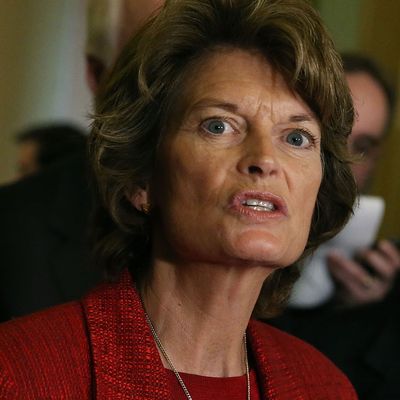
In both the House and the Senate, the strategy Republicans have devised to pass legislation to repeal and replace Obamacare is simple: Win over conservatives with broad policy provisions and then pick off moderates with narrow, strategic concessions that can be touted as prizes to the folks back home.
That has made Senator Lisa Murkowski of Alaska a likely target of special treatment from the get-go, since her state is tiny in population (barely more than 700,000 residents), but rich in distinctive health-care problems. And sure enough, the revised version of the Better Care Reconciliation Act of 2017 unveiled last week has a provision so obviously tailored for Alaska that it’s being called the Kodiak (or Caribou) Kickback — an allusion to the famous “Cornhusker Kickback” that helped pull Democratic senator Ben Nelson of Nebraska over the line in 2009 in voting for Obamacare, though it was dropped in the final 2010 version — or the Polar Payoff or the Juneau Jackpot. Here’s a brief description from Vox’s Jeff Stein:
Senate Republicans’ newest bill includes a special $182 billion fund that will give the Department of Health and Human Services broad latitude to help stabilize the Obamacare markets. This fund, which has increased as the vote on the bill draws near, is intended to reassure moderate Senate Republicans worried about its impact on the individual markets.
But to make sure it helps Alaska — and, perhaps, its moderate senator — lawmakers added a new clause to that special fund this week that will require at least 1 percent of it be spent on states where premiums run 75 percent higher than the national average. One percent may not sound like a big number, but we’re talking about Alaska, which only has 700,000 people. The state is still set to receive nearly $2 billion over 10 years.
That’s right: Alaska’s the only state that qualifies for this set-aside.
You could add to Kodiak Kickback additional provisions less specifically targeted to Alaska, but from which the state would definitely benefit. One enhances the growth in Medicaid costs allowed for states that expanded Medicaid coverage under Obamacare later than other expansion states (that would help Louisiana and Montana as well as Alaska). Another exempts expenditures on Native Americans from the Medicaid per capita cap; Alaska has the nation’s highest percentage of Native Americans.
Still another nice treat for Alaska was announced (not coincidentally) by the Department of Health and Human Services last week: a waiver that lets the state reimburse itself with federal money for funds it paid to keep insurers in the Obamacare market. That would save Alaska about $300 million over the next five years.
So is all this enough to buy Lisa Murkowski’s vote? Probably, though that’s not completely clear. After all, the Medicaid cuts in the bill are estimated to cost the state $3 billion over ten years. The impact could be magnified under an obscure provision of the bill that might generate a lawsuit to end Alaska’s Medicaid expansion almost immediately. And the cash-strapped state government (suffering acutely from low oil royalties) is not in a very good position to absorb any new fiscal shocks.
Last month, Murkowski anticipated precisely this set of circumstances, and warned she might not go along with being bought:
“Let’s just say that they do something that’s so Alaska-specific just to, quote, ‘get me,’” Murkowski said in June. “Then you have a nationwide system that doesn’t work. That then comes crashing down and Alaska’s not able to kind of keep it together on its own.”
Sounds like a pretty good prediction for the post-Trumpcare trajectory of the health-care system.
Murkowski will be under enormous partisan pressure to save her party’s bacon on health care but, then again, she’s not exactly a party regular. She won her second full term in 2010 as a write-in candidate after losing the GOP primary to hard-core conservative Joe Miller, who then won 29 percent of the vote against her in 2016 running as a Libertarian.
Without her, odds of passage for the Senate Trumpcare bill drop to approximately zero. So for all we know, Alaska’s mini gold rush of special provisions could continue.






























